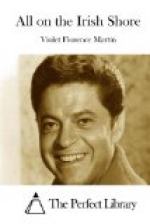Mrs. Pat scrambled out of the saddle with the speed of light, and after a few momentous seconds, during which it seemed horribly likely that the horse would relapse bodily into the drain, his and Mrs. Pat’s efforts prevailed, and he was standing, trembling, and dripping, on the narrow road. She led him on for a few steps; he went sound, and for one delusive instant she thought he had escaped damage; then, through the black slime on one of his hind legs the red blood began to flow. It came from high up inside the off hind leg, above the hock, and it welled ever faster and faster, a plaited crimson stream that made his owner’s heart sink. She dipped her handkerchief in the ditch and cleaned the cut. It was deep in the fleshy part of the leg, a gaping wound, inflicted by one of those razor slates that hide like sentient enemies in such boggy places. It was large enough for her to put her hand in; she held the edges together, and the bleeding ceased for an instant; then, as she released them, it began again worse than ever. Her handkerchief was as inadequate for any practical purpose as ladies’ handkerchiefs generally are, but an inspiration came to her. She tore off her gloves, and in a few seconds the long linen hunting-scarf that had been pinned and tied with such skilled labour in the morning was being used as a bandage for the wound. But though Mrs. Pat could tie a tie with any man in the regiment, she failed badly as a bandager of a less ornamental character. The hateful stream continued to pump forth from the cut, incarnadining the muddy road, and in despair she took Pilot by the head and began to lead him down the hill towards the valley.
Another gusty shower flung itself at her. It struck her bare white neck with whips of ice, and though she turned up the collar of her coat, the rain ran down under the neckband of her shirt and chilled her through and through. It was evident that an artery had been cut in Pilot’s leg; the flow, from the wound never ceased; the hunting-scarf drenched with blood, had slipped down to the hock. It seemed to Mrs. Pat that her horse must bleed to death, and, tough and unemotional though she was, Pilot was very near her heart; tears gathered in her eyes as she led him slowly on through the rain and the loneliness, in the forlorn hope of finding help. She progressed in this lamentable manner for perhaps half a mile; the rain ceased, and she stopped to try once more to readjust the scarf, when, in the stillness that had followed the cessation of the rain, she heard a faint and distant sound of music. It drew nearer, a thin, shrill twittering, and as Mrs. Pat turned quickly from her task to see what this could portend, she heard a woman’s voice say harshly:—
“Ah, have done with that thrash of music; sure, it’ll be dark night itself before we’re in to Lismore.”
There was something familiar in the coarse tones. The weirdness fell from the wail of the music as Mrs. Pat remembered the woman who had bothered her for money that morning in Carnfother. She and the blind old man were tramping slowly up the road, seemingly as useless a couple to any one in Mrs. Pat’s plight as could well be imagined.




